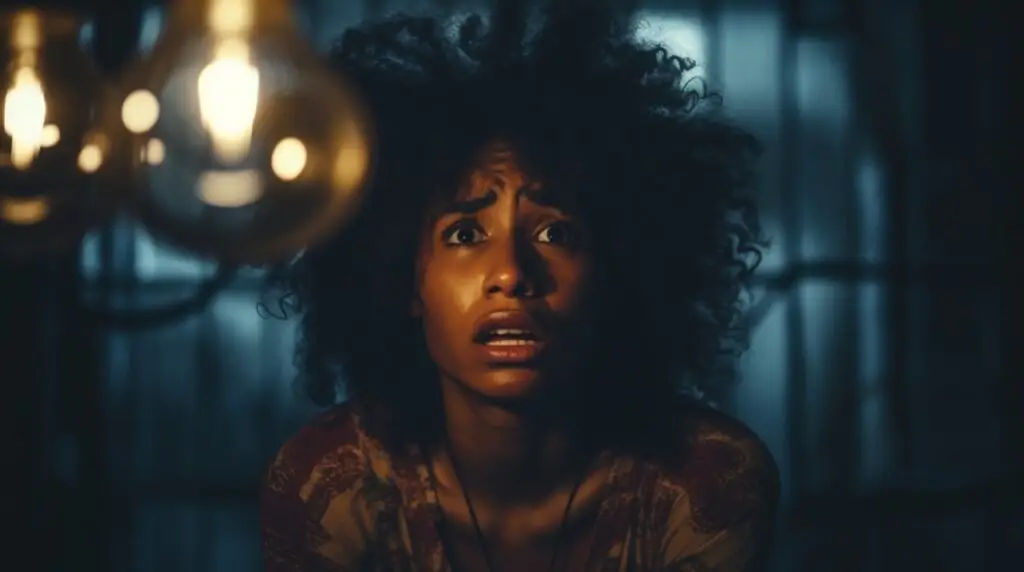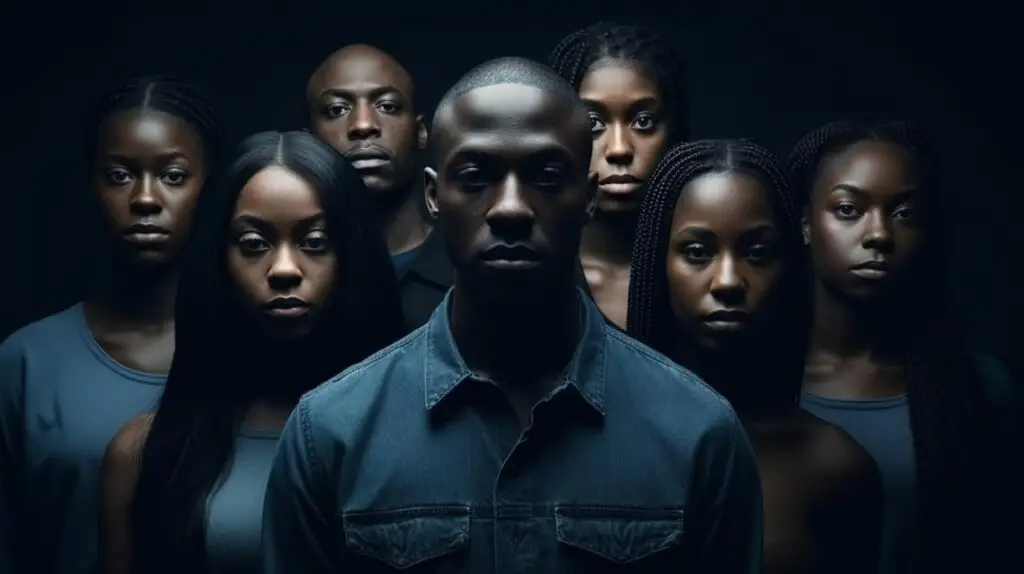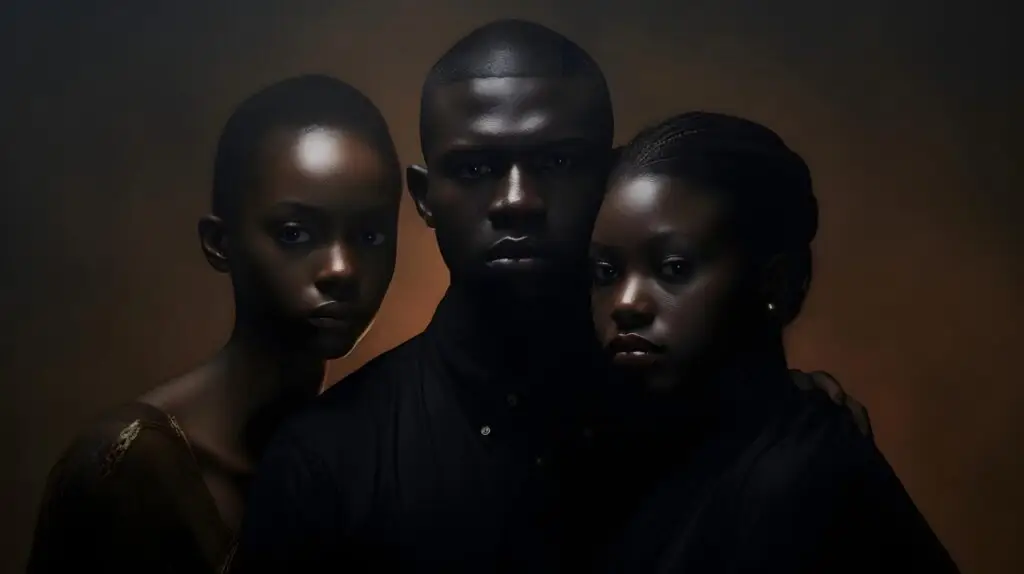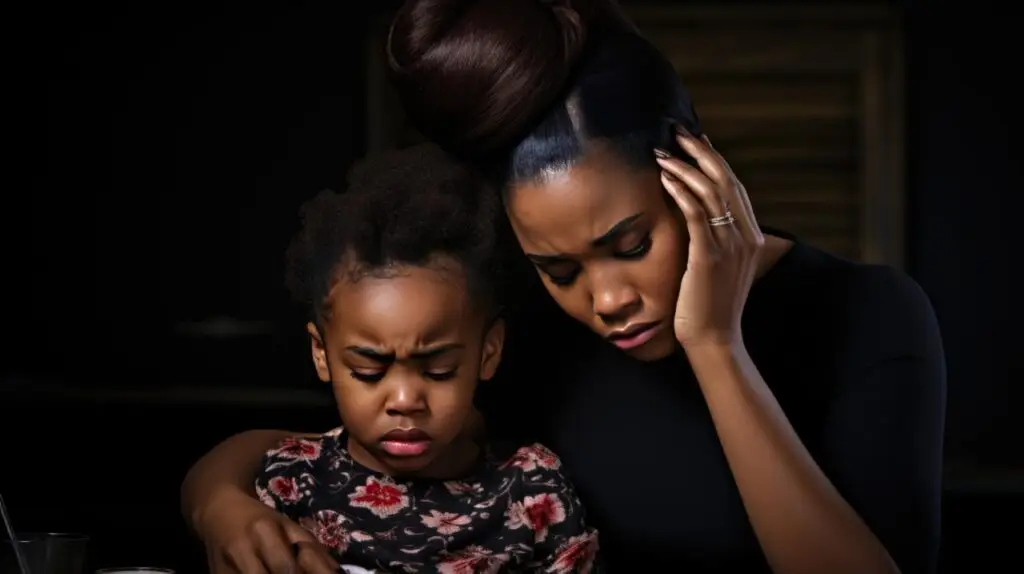Black Portraits of Healing
Black Portraits of Healing
This project encourages Black men and children to prioritize their mental health by exploring its impact on fictional Black characters through African-centered principles. Using the diagnostic framework of Azibo Nosology II 55 Culture-focused Mental Disorders, I diagnose and understand mental health concerns in a culturally sensitive manner.
Psychological Misorientation
Psychological Misorientation
Psychological misorientation involves two essential components:
(a) Interpreting reality without a consciousness aligned with one’s racial identity, lacking the cognitive framework for prioritizing own-race maintenance. (b) Cognitive structures and beliefs incongruent with African-centricity, often influenced by psychological Arabism, psychological Europeanism, or nihilism.
(a) Interpreting reality without a consciousness aligned with one’s racial identity, lacking the cognitive framework for prioritizing own-race maintenance. (b) Cognitive structures and beliefs incongruent with African-centricity, often influenced by psychological Arabism, psychological Europeanism, or nihilism.
Therapeutic Approach
Therapeutic interventions for Uncle Ruckus should challenge his distorted cognitive structures and guide him toward a more balanced and affirming understanding of racial identity that contributes to such deeply ingrained beliefs.
Although Uncle Ruckus is a Black fictional character, he serves as an illustration of how psychological misorientation may manifest in the lives of many Black men. As a therapist, I aim to assist numerous Black men in overcoming their experience of psychological misorientation by employing African-centered principles that encourage a reconnection with their Blackness and Africanness.
Although Uncle Ruckus is a Black fictional character, he serves as an illustration of how psychological misorientation may manifest in the lives of many Black men. As a therapist, I aim to assist numerous Black men in overcoming their experience of psychological misorientation by employing African-centered principles that encourage a reconnection with their Blackness and Africanness.
DSM 5 And ICD11 (Translation)
___________
Diagnosing:
The diagnosis necessitates thorough analysis by culturally competent practitioners using African-centered human sciences. Understanding the attitudinal, belief, and value elements in the client’s cognitive structure that contradict African principles is crucial. Two categories emerge—classic psychological misorientation and treasonous psychological misorientation, depending on whether these oppositional beliefs were imposed or deliberately chosen.
Uncle Ruckus from the Cartoon "The Boondocks":
- Interpreting Reality: Uncle Ruckus often negates his African heritage, even going so far as to believe he is of Caucasian descent. This aligns with the concept of interpreting reality without a consciousness aligned with one's racial identity.
- Cognitive Structure: His beliefs, values, and attitudes often reflect a strong alignment with the perceived superiority of European characteristics. His disdain for his own race and self-hate are indicative of a cognitive structure incongruous with African-centricity.
- Treasonous Psychological Misorientation: Uncle Ruckus' deliberate rejection of his own race, despite knowing the beliefs, values, and attitudes to be anti-African, could be seen as a form of treasonous psychological misorientation.

Alien-Self Disorder
Alien-Self Disorder
Involves the active rejection of one’s African heritage, coupled with an identification with cultures outside one’s own. It encompasses discomfort with racial matters, avoidance of social contact with individuals of African descent, and disaffection with traditional cultural elements.
A Tale of Alienation Cultural Disconnection
Killmonger, born as N’Jadaka, experiences a profound cultural disconnection. Raised in the United States, he is separated from the traditions and heritage of Wakanda, leading to a fractured sense of self.
Identification with Outsiders
Killmonger aligns himself with external cultures, particularly those in the U.S. military. His military background becomes a central aspect of his identity, distancing him from the Afro-centric traditions of Wakanda.
Discomfort with Racial Matters
Killmonger’s motivations are rooted in a desire to address historical injustices and systemic racism. His approach, however, involves violent means, showcasing a discomfort with racial matters and a willingness to confront them in extreme ways.
Avoidance of African Identity
Killmonger’s rejection of traditional Wakandan identity is evident in his pursuit of the throne. His vision for Wakanda involves using its resources for global dominance rather than embracing and preserving its unique cultural heritage.
Diagnosing
This diagnostic journey is marked by cultural assimilation and alienation, whereby the adaptation of external cultural elements and the resulting alienation from one’s heritage occurs. Oftentimes, there is a palpable aversion to African identity, as symptomized by a rejection of one’s roots.
Restorative Approach
In our collaborative journey towards healing, my therapeutic approach for Killmonger is deeply rooted in African-centered principles, recognizing the interconnectedness of his body, mind, and spirit. Killmonger’s displacement from Wakanda and the subsequent traumas have woven a complex tapestry of mental health challenges. Through a holistic lens, we explore the historical and personal factors contributing to his struggles, acknowledging the impact of systemic racism, ancestral trauma, and cultural dislocation on his psyche.
Although Killmonger is a Black fictional character, he serves as an illustration of how Alien-Self Disorder may manifest in the lives of many Black men. As a therapist, I aim to assist many Black men in overcoming their experience of Alien-Self Disorder by applying African-centered principles that encourage a reconnection with their Blackness and Africanness.
Although Killmonger is a Black fictional character, he serves as an illustration of how Alien-Self Disorder may manifest in the lives of many Black men. As a therapist, I aim to assist many Black men in overcoming their experience of Alien-Self Disorder by applying African-centered principles that encourage a reconnection with their Blackness and Africanness.
DSM 5 And ICD11 (Translation)
____________

Anti-Self Disorder
Anti-Self Disorder
Anti-Self Disorder is characterized by active hostility towards African/Black People and their culture. It is marked by favoring Eurasian people and culture while disparaging and undermining African/Black People.
The Layers of Hostility
In “Django Unchained,” Stephen exhibits severe hostility towards other African/Black People, particularly Django. His allegiance to slavery and willingness to undermine Black individuals’ aspirations are evident. Stephen actively opposes his own community, aligning himself with the oppressors.
Favoring the Oppressors
Stephen aligns himself with the white slave owners, particularly Calvin Candie. He not only serves them but also actively contributes to the perpetuation of the brutal system of slavery. His allegiance to the oppressors is marked by a desire to be in their favor, even if it means betraying his own community.
Undermining African Culture
Stephen participates in the denigration of African culture by actively contributing to the dehumanization of enslaved individuals. His role in maintaining the status quo involves suppressing any attempts by fellow Black individuals to challenge or resist their oppressive circumstances.
Active Opposition to Affirmative Development
Stephen actively opposes any form of affirmative development within the African American community, as seen in his opposition to Django’s quest for freedom and justice. His actions maintain the existing power dynamics rather than supporting positive change within his community.
Diagnosing
Social and Economic Persecution
This is visible through acts of discrimination that target certain sections of society based on their race, religion, economic status, or other factors.
Opposition Against Development
When there is resistance to policies or actions aimed at creating a more equitable society, it’s often a symptom of deeper underlying issues. (Akbar, 1981)
This is visible through acts of discrimination that target certain sections of society based on their race, religion, economic status, or other factors.
Opposition Against Development
When there is resistance to policies or actions aimed at creating a more equitable society, it’s often a symptom of deeper underlying issues. (Akbar, 1981)
Restorative Approach
Here are 4 ways that I address Alien-self disorder:
- Ancestral Healing: This involves acknowledging and honoring the wisdom and resilience of one's ancestors
- Cultural Reconnection: This means Actively engaging with and embracing one's cultural identity.
- Community Reintegration: This involves reconnecting individual with their broader community and creating a supportive network
- Empowerment: This means building resilience, self-esteem, and a sense of agency.
Although Stephan is a Black fictional character, he serves as an illustration of how Anti-Self Disorder may manifest in the lives of many Black men. As a therapist, I aim to assist many Black men in overcoming their experience of Anti-Self Disorder by applying African-centered principles that encourage a reconnection with their Blackness and Africanness.
DSM 5 And ICD11 (Translation)DSM 5 And ICD11 (Translation)
______________________

Negativists-Pejorativists Profile (N-PP)
Understanding, Diagnosing, and Treating
Excited to share insights from my work as a doctoral student in clinical psychology, focusing on the unique challenges faced by Black men. I’ve delved into the Negativists-Pejorativists Profile (N-PP), a syndrome derived from unfavorable descriptions of African-U.S. personality in classic Western-based theories.
Unpacking N-PP Symptoms among Black Men
My work explores symptoms sourced from Kardiner, Pettigrew, Vontress, Mosby, Karon, and Kirk, offering a lens through which we can understand the psychosocial challenges faced by Black men. From immediate gratification tendencies to struggles with self-esteem, these symptoms reflect a distorted view of normalcy.
Nuanced Diagnosis: Tailoring Approaches for Black Men
While precise guidelines for diagnosis are evolving, it’s essential to consider both intensity and number of symptoms when working with Black men. Recognizing that one intensely held symptom may be as impactful as several less penetrant ones is key to providing effective support.
Reclaiming Mental Health Narratives for Black Men
All symptoms associated with N-PP are negative and pejorative, underlining the importance of challenging stereotypes perpetuated by outdated theories. It’s crucial to acknowledge the impact of historical perspectives on mental well-being and work collaboratively to redefine narratives that embrace the diversity of Black men’s experiences.
Holistic Approach to Address N-PP Amoung Black Men
Addressing N-PP requires a nuanced, culturally sensitive treatment approach. Collaborative therapy that integrates Afrocentric principles, acknowledges historical trauma, and empowers individuals to redefine their narrative can be highly effective. Therapists must be attuned to the cultural nuances and unique stressors faced by Black men, fostering a safe and trusting therapeutic alliance.
Community Support and Advocacy
Beyond individual therapy, community support and advocacy play a crucial role. Empowering Black men to connect with supportive networks, engage in culturally affirming activities, and participate in community initiatives can contribute to resilience and overall well-being.
A Call to Action
As we navigate the complexities of mental health, let’s not only understand but actively contribute to the transformative change needed in our approaches to therapy. I invite you to share your insights, experiences, and strategies for fostering an inclusive and accurate understanding of psychological health in the context of Black masculinity. Together, we can build a future where mental health support is truly accessible and tailored to the diverse needs of all individuals.

Negromachy
DSM 5 And ICD11 (Translation)
________________________
Negromachy
Negromachy, as per Thomas (1971), refers to the confusion and doubt of self-worth in African-U.S. individuals due to a reliance on standards and definitions from White American culture. To extend the discussion globally, one can replace “White American” with Eurasian.
The Journey of Restoration from Negromachy
Although Troy is a fictional Black character, I work collaboratively with many Black men experiencing similar issues by establishing a foundation of trust, creating a secure space for men to share his thoughts and emotions. I help explore the historical and cultural influences that have shaped your identity, shedding light on the roots of your self-worth struggles. Our focus extends to self-reflection, encouraging Troy to examine his values and roles within the context of his cultural identity. We work on enhancing interpersonal relationships, employing communication strategies to navigate tensions and foster understanding.
I help many Black men and children similar to Troy overcome Negromachy by incorporating African-centered practices to allow them to feel capable, connected to their cultural heritage, and confident in their self-worth.
Diagnosing
Distinguishing Negromachy from N-PP may pose challenges, but the key difference lies in the exclusive focus of Negromachy on personal self-worth, whereas N-PP encompasses symptoms related to both personal and extended self-matters.
Troy Maxson from the Movie “Fences”& Negromachy
Troy Maxson is a complex character whose experiences align with some aspects of the Negromachy diagnosis. Here are some ways in which Troy Maxson’s character may be seen to resonate with elements of Negromachy:
- Struggle with Self-Worth: Troy grapples with a deep sense of self-worth and significance. His experiences of racial discrimination and the limited opportunities available to Black individuals during his time contribute to his feelings of frustration and inadequacy.
- Dependency on White American Standards: Troy's aspirations and understanding of success are influenced by societal expectations shaped by White American standards. He strives for a sense of achievement within a system that often marginalizes Black individuals, leading to inner conflicts.
- Conflict in Personal Relationships: Troy's relationships with his family members are marked by tension and conflict. His struggles with his son, his strained marriage, and his interactions with his brother reflect the interpersonal challenges that can arise from internal conflicts related to identity and self-worth.

Mentacide
Definition
Mentacide is a concept rooted in the intentional and systematic destruction of an individual’s or group’s mind, specifically targeting their cultural identity and psychological well-being. Coined by Dr. Bobby Wright, mentacide involves a deliberate effort to eradicate pro-African orientations and replace them with pro-Eurasian sentiments. This process is executed through societal institutions projecting images, values, beliefs, and opinions that undermine correct orientation, rendering individuals vulnerable to mental disorders and societal estrangement. Mentacide is considered a potent tool in the perpetuation of cultural imperialism, acting as a precursor to physical or psycho-cultural extirpation.
Django from the movie Django
- Historical Trauma: Django has endured the trauma of slavery, witnessing and experiencing extreme violence, dehumanization, and degradation. This historical trauma can be seen as a form of mentacide, contributing to the deliberate destruction of his identity and well-being.
- Internalized Oppression: Throughout the film, Django faces the challenge of breaking free from the internalized oppression ingrained in him by years of slavery. The constant devaluation and dehumanization of Black individuals in the film's setting have likely left lasting scars on Django's psyche.
- Cultural Alienation: Django's quest for freedom and justice occurs in a society that systematically marginalizes and oppresses Black individuals. His journey involves navigating a hostile environment where his cultural identity is consistently undermined.
- Psychological Manipulation: Django's experiences, including witnessing the mistreatment of other slaves, could be seen as a deliberate psychological manipulation to ensure the destruction of his pro-African orientation, forcing him to adopt survival mechanisms that align with the dominant, oppressive culture.
Diagnosis
The diagnostic criteria for Mentacide involve the deliberate and systematic destruction of an individual’s or group’s mind with the explicit aim of extirpating their cultural identity. As a diagnostic framework, Mentacide acknowledges the bi-partite nature of its effects, disrupting both the peripheral, non-racial aspects of personality and the primary, own-race maintenance orientations, leading to a range of mental disorders within affected individuals.
It’s essential to clarify that mentacide, as described in the provided text, is not a clinically recognized mental health disorder but rather a concept rooted in historical and cultural analysis. Applying this concept to fictional characters, such as Django from “Django Unchained,” involves interpreting their experiences through the lens of deliberate and systematic destruction of an individual’s or group’s mind with the intention of extirpating that group.
It’s essential to clarify that mentacide, as described in the provided text, is not a clinically recognized mental health disorder but rather a concept rooted in historical and cultural analysis. Applying this concept to fictional characters, such as Django from “Django Unchained,” involves interpreting their experiences through the lens of deliberate and systematic destruction of an individual’s or group’s mind with the intention of extirpating that group.
Restorative Process from Mentacide
Although Django is a fictional Black character, I work collaboratively with many Black men experiencing similar issues by fostering a profound reconnection with our African cultural roots, aiming to counteract the cultural destruction he we endured., I empower Black men who resonate with Django to critically assess their external influences, offering a pathway to renewed agency over their narrative. In therapy, I facilitate a supportive environment that allows Black men who resonate with Django to share their struggles, promoting a sense of belonging and mitigating the isolation induced by mentacide. By encouraging Black men to actively challenge oppressive cultural influences and contribute to reshaping societal perceptions, we pave the way for a positive cultural orientation.
I challenge Black men to overcome their historical trauma, internalized oppression, and experiences of being alienated to feel culturally connected and authentically liberated.


